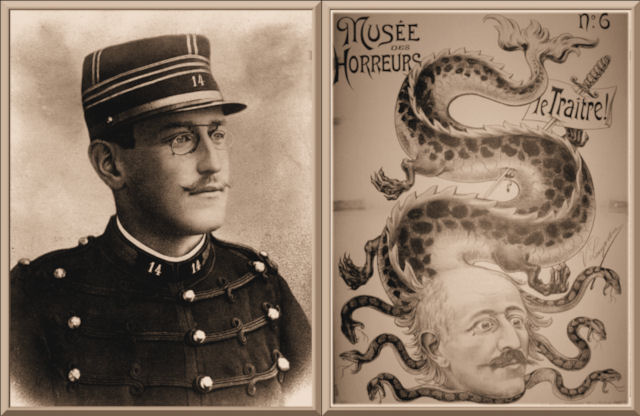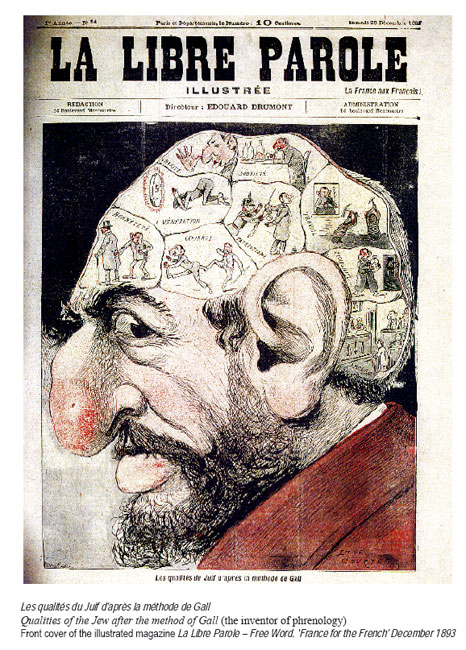Why we cannot forget Dreyfus. The time was la belle epoque, and the stage was france. But the chief actors in the drama- the double agents, perfidious generals, conniving politicians, and anti-Semites posing as patriots- have remained on the political scene ever since….
The Dreyfus Affair, as Charles Peguy wrote in his memoir-meditation Notre Jeunesse, was a “chosen” event that happened to the Jews and the French, two chosen peoples. Peguy, of course, had a religious mind: he was a religious Catholic, a religious French nationalist, and a religious defender of the Dreyfusist cause. It is not necessary to believe in a literal vocation of events, nor subscribe to any of the French poet’s overlapping mystiques, to sense a profound and almost intelligible insight underlying his prose. Whetehr or not one views the Dreyfus Affair in Peguy’s terms as a kind of transcendent morality play staged by two sets of elite performers for the benefit of mankind, one can scarcely fail to recognize in it an archetypal quality that makes it one of history’s classic productions.

—The Dreyfus Affair was the culmination of the major conflicts that raged in nineteenth-century France and Europe and in Hannah Arendt’s words it “offers a foregleam of the twentieth-century.”Roselyne Koren has explored how what the French simply refer to as “the Affair” has become the archetype of all political crises and Franco-French conflicts. This is because the Affair crystallized certain aspects of modernity, including the struggle over human rights, equality before the law, democratic control over political institutions, the role of the masses, and how they are influenced by the new media, and created the modern intelligentsia as arbiters of social values and defenders of the oppressed. The Affair staged the enduring conflict of national security and raison d’etat versus individual rights and pitted moral exigencies against political expediencies. The Dreyfus Affair was, thus, “a decisive episode in political–as well as in the intellectual and cultural–history of modern France” and Europe more generally. —Read More:http://www.h-net.org/reviews/showrev.php?id=7441
Apart from anything else, it is a deeply moving human drama on the ageless theme of innocence falsely accused and triumphantly vindicated, but it is several other things as well. It is not only timeless but topical. Its key episodes illustrate basic modern social, cultural and political patterns, or dilemmas, and not merely nineteenth-century French ones. As Hannah Arendt said, the affair was “a kind of dress rehearsal for the performance of our time.” Its central characters wear the costumes and speak the idiom- and are driven by the passions- of la belle epoque, but the types they represent are remarkably, sometimes disquietingly, contemporary.

—In 1894, Alfred Dreyfus, a French army intelligence officer, was arrested, tried and convicted of being a spy. There was no evidence against him: what was most significant was that he was a Jew. The military hierarchy pursued the case against Dreyfus even when it was clear to all but the most prejudiced that Dreyfus was innocent. It took 12 years of social turmoil, violence and lobbying for him to be finally cleared of the charges. Captain Dreyfus came to represent the struggles between the individual and the state, between civilian government and military authority, between the politics of parliamentary institutions and the politics of the mob.
The Dreyfus Affair changed the way politics, the media and society operated into the 20th century.—Read More:http://www.sydneyjewishmuseum.com.au/Exhibitions/Past-Exhibitions/J-Accuse—The-Dreyfus-Affair/default.aspx
In reading the history of the affair, we have the impression that we have seen the same actors in other spectacles closer to our own day. Some of the roles they play seem almost cliches.
The predestined Innocent Scapegoat: Capt. Alfred Dreyfus himself, sentenced in 1894 as a spy and traitor to solitary confinement on Devil’s Island for life, retried after five years, pardoned and finally vindicated. The certainty of his innocence is one of the few traditional interpretations of the affair spared by modern historians’ compulsive revisionism. Contemporary newspaper reports, artists’ sketches of courtroom scenes, and political cartoons make it clear why he was predestined to this role. …(to be continued)…





 COMMENTS
COMMENTS